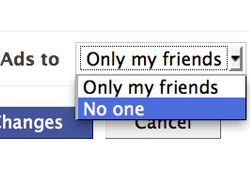Social Advertising: Serendipity+ or In-Authentic Engagement?
 In recent weeks we have run a number of large-scale social ad campaigns for clients. On both the new twitter ads platforms in the shape of Promoted Accounts and Promoted Tweets, and also on Facebook running sponsored stories and page ads.
One thing that's a common strand across these platforms, and is now becoming more deeply ingrained into Google's own Adsense platform, is the ability to target users based on behaviour, who their friends are, and "their social signals", those social actions we each make day as we like, comment and share out way through the web.
In recent weeks we have run a number of large-scale social ad campaigns for clients. On both the new twitter ads platforms in the shape of Promoted Accounts and Promoted Tweets, and also on Facebook running sponsored stories and page ads.
One thing that's a common strand across these platforms, and is now becoming more deeply ingrained into Google's own Adsense platform, is the ability to target users based on behaviour, who their friends are, and "their social signals", those social actions we each make day as we like, comment and share out way through the web.
In a conversation earlier this week (see below) with Vicky Beeching (and more of her thoughts on her blog) I got thinking about just how authentic these forms of engagement are. There are two quite clear strands of thought about this.
From the point of the view of the advertiser, we are given an unparalleled opportunity to, (when done well) get messages in front of those who are far and away the most likely to be interested in what we have to say. In ad-land-utopia this means we get a far more personalised user experience, get less shoddily targeted ads in our various streams and feeds, and hopefully get introduced to some cool products and people that we wouldn't otherwise know about.
However we don't live in the mythical ad-utopia, and so in practice it doesn't always go quite that smoothly. In reality, some people make a random action on Facebook, outside their normal pattern and get thrown some curve ball ads for a few days. Over on twitter you talk about your mobile home for a weekend and then spend two weeks getting ads on twitter about upgrading your phone line rental.
Now of course in most cases this is not the result of people being intentionally annoying, but rather them not having a clear understanding of both the technology and the psychology of advertising in social spaces. I mention the psychology element, because actually this is often the most misunderstood.
These social spaces have a certain aesthetic that other advertising mediums do not, which is that despite the 800 million users on Facebook, to each user their profile and news feed is "theirs". We have a sense of ownership and possession over these digital living rooms. Most of you would be pretty upset if I walked into your living room and erected a giant billboard! That sentiment lives online too.
It's also compounded by the increase in mobile consumption of platforms like Facebook and Twitter. If the figures are anything go by we are consuming nearly every social platform increasingly via smartphones and tablets - these devices command an enormous (and in some cases unhealthy) amount of personal affection. They walk with us, most people I know sleep with them within touching distance. So when you combine the personal attachment we hold to both of these technologies it's not unsurprising that a bit of bad targeting can really rile some people.
When all is said and done there are of course commercial factors at play here. Facebook shares, now more than ever need to start shifting, stock prices need restoring - and a big way that Facebook is able to justify its existence to shareholders is its ability to monetize its phenomenally sized user base. Twitter is on the same path, and Google will keep step to save both face and market share.
Unfortunately for those who don't like their news feed being overtaken like an FA Cup final pitch invasion, it may be too late - the advertisers are coming. And mainly because they have too. Print circulation is dipping, ad rates going up and marketing directors the world over are taking long hard looks at their traditional "buy big, but everywhere" strategies, because TV is failing to provide the kind of responsive real-time data that social and mobile can. The economics of it all are kind of too hard to fight.
So this raises a question for those of us who look at these things through a lens that wants to see more transparency on the web. Is this feeling of false serendipity duping us? Are we being played for fools? Or as consumers should we be pleased that our data can give us a more personalised experience?
I think however you feel about it, how precious your data is it you, is an important thing for us to wrestle with - but know this, there are only two options. Live with it. Or leave - because the Ad men aren't going anywhere.